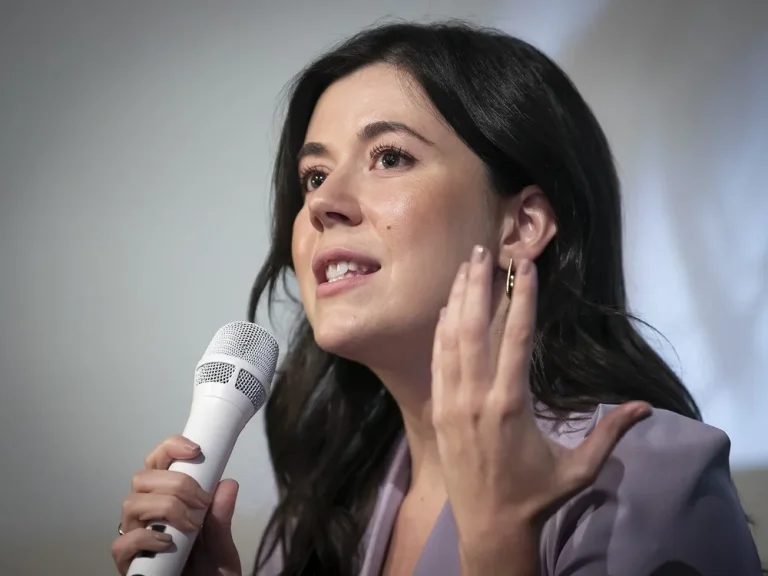Catherine Fournier (born April 7, 1992) has emerged as one of Québec’s most dynamic political figures, known for her principled leadership and commitment to civic engagement. She first made history in 2016 by becoming the youngest woman ever elected to Québec’s National Assembly at age 24. Since then, she has transitioned from provincial politics to municipal leadership, currently serving as the Mayor of Longueuil, a role she assumed in November 2021. Fournier is recognized for her focus on youth engagement, infrastructure, democratic renewal, and Québec sovereignty, shaping a distinct political voice in both local and provincial spheres.
Quick Facts of Catherine Fournier
| Full Name | Catherine Fournier |
|---|---|
| Date of Birth | April 7, 1992 |
| Place of Birth | Sainte-Julie, Québec, Canada |
| Nationality | Canadian (Québécoise) |
| Education | Bachelor’s in Economics (major) & Political Science (minor), Université de Montréal; Cégep du Vieux Montréal; U.S. student exchange via AFS program |
| Provincial Office | Member of National Assembly (MNA) for Marie-Victorin, Dec 5, 2016 – Nov 7, 2021 |
| Municipal Office | Mayor of Longueuil, Nov 14, 2021 – present |
| Political Parties | Parti Québécois (before 2019) → Independent (2019–2021) → Coalition Longueuil (municipal) |
| Notable Achievements | Youngest female MNA in Québec history; Mayor of Longueuil; recognized among 16 most influential Québecers (2024) |
| Net Worth | Not publicly disclosed; likely derived from public office and writings |
Early Life and Education
Born in Sainte-Julie, Montérégie, Québec, Catherine grew up with a strong sense of community and civic responsibility. From a young age, she was drawn to social issues and political activism. She completed her cégep studies in humanities, enriched by an international student exchange in the U.S., and earned a Bachelor’s degree in Economics with a minor in Political Science from the Université de Montréal. These experiences helped shape her analytical approach, global perspective, and dedication to youth participation in politics.
Political Career and Milestones
Fournier’s first electoral venture came in 2015 when she ran for the Bloc Québécois in Montarville, finishing second. She soon became vice-president of the Bloc and later worked as a political attaché under PQ leader Pierre Karl Péladeau, gaining experience in policy, strategy, and party ideology.
Her political breakthrough came with a by-election in Marie-Victorin on December 5, 2016, where she became the youngest woman elected to Québec’s National Assembly. During her tenure as MNA, she addressed housing, immigration, LGBTQ+ rights, women’s issues, and democratic reform. In 2019, she left the Parti Québécois to serve as an independent, citing misalignment with party values, and continued in office until 2021.
Transition to Municipal Leadership
In 2021, Catherine shifted focus to municipal politics, forming Coalition Longueuil-Équipe Catherine Fournier. She campaigned on infrastructure renewal, environmental sustainability, housing affordability, and inclusive governance. Winning decisively on November 7, 2021, she assumed office as mayor at age 29, becoming one of Québec’s youngest mayors of a major city.
Her mayoral priorities include addressing homelessness, improving infrastructure, promoting environmental conservation, and fostering citizen participation. She has publicly expressed her intent to seek re-election in 2025.
Personal Challenges and Advocacy
A defining personal-public moment involved revealing she was a victim of sexual assault by former MNA Harold LeBel. She requested lifting the publication ban on her identity in 2023, bringing national attention to issues of victim rights, media transparency, and political accountability. Fournier’s openness demonstrates her commitment to integrity, advocacy, and systemic reform.
Publications, Influence, and Recognition
Fournier has contributed to several publications and collective works emphasizing youth participation and civic engagement. In 2024, L’Actualité ranked her among Québec’s 16 most influential figures, reflecting her growing prominence as both a municipal leader and a political role model.
Personal Life
Catherine Fournier keeps her personal life private, with no publicly confirmed spouse, partner, or children. Her public identity focuses on her roles as daughter, civic leader, and advocate for social change.
Financial Standing and Lifestyle
Her net worth is not publicly disclosed, with income likely derived from her mayoral salary, previous legislative compensation, and contributions from writing or speaking engagements. She maintains an active public presence, balancing municipal responsibilities with media engagement and community involvement.
Legacy and Impact
Catherine Fournier represents a new generation of Québec leaders: principled, transparent, and youth-focused. Her career illustrates a blend of activism, governance, and personal courage, positioning her as a transformative figure in both municipal and provincial politics. Her work in Longueuil and beyond serves as a model for inclusive, accountable, and forward-looking leadership in Québec.








